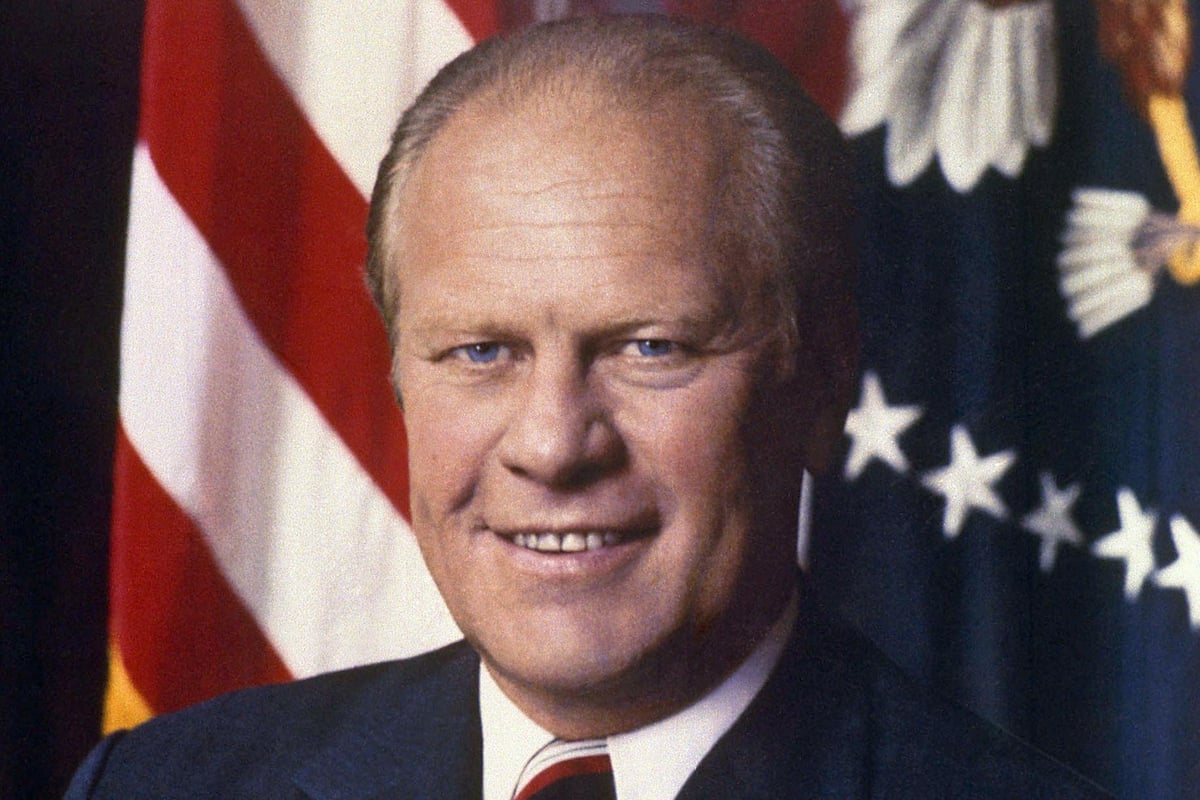By By The Newsroom
Gerald Ford was born Leslie King on July 14 1913 in Omaha, Nebraska, the only child of Dorothy Ayer Gardner and Leslie Lynch King Snr. Both parents were of predominantly English heritage but Gardner had some Ulster-Scots ancestry. Gardner separated from King because of his abusive behaviour just 16 days after her son’s birth. She took her son with her to the home of her sister and brother-in-law in Illinois. From there, she moved to the home of her parents in Grand Rapids, Michigan. After living with her parents for two-and-a-half years, in 1917 Gardner married Gerald Rudolff Ford and Leslie King was raised as Gerald Rudolph Ford Jnr. The name change was only formalised in 1935. Ford combined studying economics at the University of Michigan with a successful career playing football and as a coach. He then studied law at Yale, graduating in the top third of his class in 1941, and developed a keen interest in Republican politics. During the Second World War he served in the Navy, saw combat in the Pacific and attained the rank of lieutenant commander. Before the war he had been a protectionist and an isolationist but, realising these policies contributed to the outbreak of the war, he became an ardent internationalist. In 1948 he unexpectedly secured election to Congress where he served 25 years and was minority leader in the House between 1965 and 1973. He described himself as ‘a moderate in domestic affairs, an internationalist in foreign affairs, and a conservative in fiscal policy’ and was admired across the aisle for his hard work, affability and integrity. In 1973, when Richard Nixon’s vice president, Spiro Agnew, resigned in disgrace, Nixon had no option but to nominate Ford as the only Republican whom House Democrats would approve. He accepted the nomination, telling his wife that the vice presidency would be ‘a nice conclusion’ to his career. He was only Veep briefly because when it became clear that Nixon would face criminal charges for his role in the Watergate scandal and three articles of impeachment had been passed by the House Judiciary Committee, Nixon resigned on August 9 1974. Automatically becoming president, Ford took the oath of office and observed: ‘My fellow Americans, our long national nightmare is over. Our Constitution works; our great Republic is a government of laws and not men. Here the people rule.’ On September 8 1974, Ford granted Nixon a full and unconditional pardon for any crimes he might have committed against the United States while president. A controversial decision, Ford was accused of a ‘corrupt bargain’ with Nixon whereby in return for Nixon’s resignation, Ford became president. Ford hoped to draw a line under Watergate to allow Americans to move on but at the time a great many Americans did not see it that way. The New York Times claimed that the pardon was ‘a profoundly unwise, divisive and unjust act’ and that it had destroyed Ford’s ‘credibility as a man of judgment, candor and competence’. Ford’s approval rating plummeted from 71% to 49%. The controversy is usually regarded as the primary reason Ford narrowly lost the 1976 presidential election to Jimmy Carter, an assessment with which Ford agreed. After Ford left the White House, he privately justified the pardon by carrying in his wallet a portion of the text of Burdick v. United States, a 1915 Supreme Court decision which stated that a pardon indicated a presumption of guilt, and that acceptance of a pardon was tantamount to a confession of that guilt. In his inaugural address, Carter publicly thanked Ford for his contributions to the nation. Clearly appreciating Ford’s motive with respect to the pardon, Carter said: ‘For myself and for our nation, I want to thank my predecessor for all he has done to heal our land.’ Carter’s warm words were a celebration of the peaceful transition of power, the beginning of a re-evaluation of the pardon and a measure of his respect for Ford, despite their recent political rivalry. Ford was hurt at losing the presidential race but he got over it. Ford and Carter became close friends when they travelled together to Anwar Sadat’s funeral in 1981. In historian Douglas Brinkley’s opinion, ‘if Ford and Carter had been two regular guys who happened to live in the same community, they would have been friends, because they have similar values’. As ex-presidents and friends, Carter and Ford monitored foreign elections together and promoted human rights and international health causes. In 2001, Ford was presented with the John F Kennedy profile in courage award for his pardon of Nixon. Senator Edward Kennedy acknowledged that at the time he opposed the pardon, but had concluded that history had vindicated Ford’s decision. Ford died on December 26 2006, and in 2011 the State of Michigan presented a statue of Ford to the National Statuary Hall Collection in the Capitol. Ford is depicted wearing a three-piece suit and leaning forward, his feet splayed and his slightly raised left heel suggesting forward motion. According to the sculptor this posture was intended to convey ‘the idea of someone standing up to serve their country when called’. The pedestal, clad in India Black granite, is inscribed on the front with Ford’s name, life dates, positions and terms of federal service, and the state name ‘Michigan’. On the proper right side is inscribed a quotation from a tribute by ‘Tip’ O’Neill, Speaker of the House during Ford’s presidency: ‘God has been good to America, especially during difficult times. At the time of the Civil War, he gave us Abraham Lincoln. And at the time of Watergate, he gave us Gerald Ford – the right man at the right time who was able to put our nation back together again.’ On the proper left side are words quoted above from Ford’s swearing-in address. The statue was unveiled in the Capitol Rotunda on May 3 2011.
